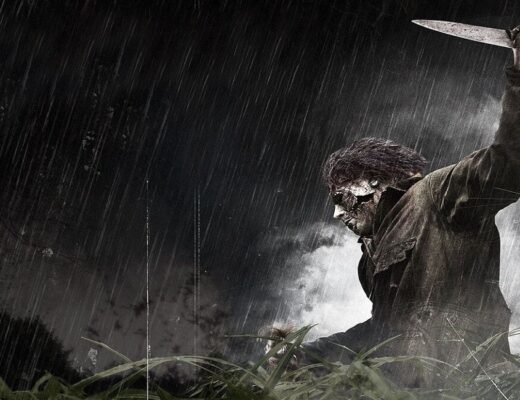Before the colonization of New England by the forebears of the American empire, what would come to be known as Rhode Island today was principally inhabited by several Native tribes — among them, the Wampanoag. For the Wampanoag, death was to be understood not only as a loss, but also as a form of transference, an exchange to the cyclical nature of the world. Bodies buried in the earth could be compared to seeds that would come to bloom in the next season of regeneration. The very ground which gave birth to all that would rise from the forest floor was possessed, in this sense, by the spirits of the dead. Every flower, tree, and blade of grass, haunted.
Michael Roemer’s New England-set film Vengeance is Mine, originally titled Haunted, tells the story of Jo (Brooke Adams) as she makes a pilgrimage back home to confront head-on her miseries on the East Coast before moving to Seattle. Included in this list are her long-lost biological mother, a vituperative, dying adoptive mother, and an abusive former husband, Steve (Mark Arnott). In her lowest moments, Jo meets an unexpected friend in neighbor Donna (Trish Van Devere), her husband Tom (Jon DeVries), and their teenage daughter Jackie (Ari Meyers). Donna, initially a welcome mirror to Jo’s own neurotic tendencies, becomes increasingly unwell as the film progresses. This ultimately crystallizes as a duel between the two women, each battling the other in the midst of their own individual gravitations toward emotional destruction.
Haunted premiered in 1984 as a television movie, in some sense dooming it to be lost to the annals of history. It was not received with anything resembling critical praise, nor was it an immediate candidate for a physical release. In part due to the lackluster reception, it was also Roemer’s last feature. Only in 2022, when The Film Desk moved to restore the film and give Haunted its first wide theatrical run, was it brought back to life in the public consciousness with a new title — Vengeance is Mine. This year has brought that very same restoration to a proper Blu-ray courtesy of The Film Desk and Vinegar Syndrome.
The film’s first half extends an understanding eye to the plights of both Jo and Donna as burdened women, disgraced and allied by childhood trauma that has lived out into their present lives. Both women are tormented by their pasts. For Jo, this return home was an attempt to reckon with the gnawing wound that’s troubled her. Conversely, we meet Donna as she is ready to unravel, as if one pulled string might collapse her completely. It’s at the halfway mark that Jo’s attention shifts to Jackie, who suffers greatly at the hands of her mother. Where once she found a girl, she now sees a reflection of her own distraught upbringing. Jo’s mirror, and so her attention, has shifted. But Vengeance is Mine’s latter section shatters this camaraderie, bringing down a hammer on the film’s established rhythms, as both Jo and Donna frantically scramble against each other for the affections of Tom and Jackie.
Jackie’s abuse acts as an echo of Jo’s, down to the acts committed. Early in the film, Steve viciously cuts Jo’s hair in anger, and the same is done to Jackie by Donna. Poetically, Jackie echoes Jo’s words literally. In a motel room, Steve tells Jo he loves her. Jo replies, “I know.” Donna’s declaration of love for Jackie, delivered after a hailstorm of putrid insults, is met with the same. Without any real force bonding them, Jo and Jackie have forged a spiritual connection that is as maternal as it is desperate. Jo says as much to Tom earlier: “Just so you know, when I was sixteen I had a child, a girl. I never saw her. When I woke up, she was gone, adopted. That’s why I want to see Jackie.” Donna can only watch as her family is stolen by this stranger whom she once considered a friend, propelling her self-sabotaging behaviors. In short, it’s a film full of contradictions, resting on uneasy ground occupied by two volatile forces constantly crashing into one another. These frequent clashes buckle the foundations of suburbia and wring out the haunted nature of the roles these women occupy; both victims to their personal histories, the narratives drawn into these homes reverberating in misshapen reiterations even decades later. Try as they might, they are powerless to the “spirits” present in the neighborhoods and familial structures that birthed their pain.
Palestinian filmmaker and radical film educator Saeed Taji Farouky speaks on this very challenging aspect of Roemer’s narratives, drawing on Roemer’s own book, Telling Stories: “To adequately reflect the chaos of our world, a film must be constantly on the verge of collapse.” This notion is best characterized by the erratic behavior of Donna as she descends further into her interior world and puts at risk everything Jo, and the audience, have come to care for. But for as heavy as Vengeance is Mine is, the film does float, its deceptive simplicity hiding a vision all too rare in today’s cinema. Every landscape, refraction, and close-up has the integrity of a film earnest to earn its beauty. The images are not showy, but rather, Roemer’s eye drifts toward the outer bounds of New England’s allure and the magnetic draw of nature’s defiance to the malignancy at the heart of the suburbs. Driving the film are the nuanced, intimate performances from the women at its center. Adams is peerless, hiding a biting distress well, only amplified by the understated, captivating blocking that feels like a revelation all these years later. Devere occupies the harder role, convincing us at once of her humanity and her terror, standing both enormously over the family and, in a turn, cowering to her own cruelty.
Both women act in inappropriate and callous ways, but what’s most telling about Roemer’s film is the startling empathy with which every party is rendered. In an interview with Mubi’s Brandon Kaufman, Roemer states: “I was always afraid of the melodramatic aspect of the whole thing. I’m so afraid of melodrama, but I think I’ve accepted that it was valid. In Vengeance is Mine, nobody wants to do what they did. Everybody had to do it.” This fated spiraling toward chaos is in many ways reflective of Roemer’s philosophy of stories and life. Roemer, a Jew born in Germany just five years before Hitler’s ascent, was catapulted into a barbaric and unjust society. He is frequently critical of the notion that humanity could have any grasp over their lives; in his mind, people are beholden to powers beyond them, acts of a god they don’t believe in.
Roemer’s view of death does not easily map onto the beliefs of the Wampanoag. In fact, his secular approach to the frenzied order of the world would stand in stark opposition to the former’s view on the matter — Roemer would hardly stand to characterize the world as full of spirits. But still, he’s haunted. And in his pursuit of an emotional truth, Roemer demonstrates the power of these ghost stories we inhabit in our day-to-day lives. Vengeance is Mine ends how it begins: in a symphony of emotions running across Jo’s face. There’s a melancholic radiance to her in this moment, something that has played out partly as a ghost story and inevitably as a return.







